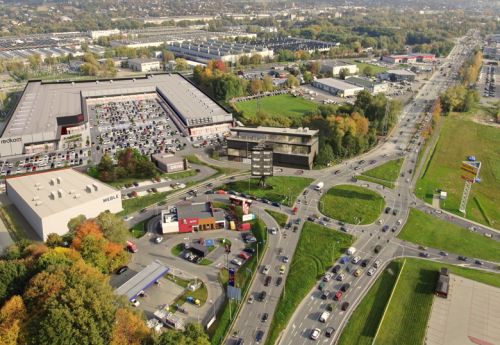Never discounting the possibility
Retail & leisure
The poor reputation of discount stores as selling a limited range of products at lower prices, and on top of that of an inferior quality, has now been consigned to the dustbin of retail history. These stores had been associated with people of slender means, a reputation exacerbated by the rather spartan and simple layout of the stores and the ubiquitous in-your-face signs telling you how cheap the products were. However, this is all a thing of the past. Discount chains have been working on improving their reputations and images with better quality goods and nicer premises.
Changing perceptions
Indeed, this form of retail has evolved dramatically in the last few years and reflects the changes taking place on the retail market, particularly in the grocery segment. Stores in this segment have been starting to resemble one another. Discount stores have chosen to go up in the world, by focusing on improving the quality of their products and the premises and the sales floor area. Now they are not much different from supermarkets, which have started to take on features of discount shops on the other hand. It is interesting that after the announcement of the bankruptcy of Alma Market (which operated Delikatesy Alma) its units were often picked up by discount chains: mostly Biedronka and Lidl. A Biedronka has opened instead of Alma on 1,600 sqm of Tarasy Zamkowe in Lublin as well as in Galeria Jurajska in Częstochowa, where it occupies 1,300 sqm. Biedronka is also the grocery operator of Focus Mall Zielona Góra (1,480 sqm). Interestingly, in some locations discount stores complement other grocery store operators. This is the case in the recently opened Wroclavia in Wrocław owned by Unibail-Rodamco, where Biedronka operates together with Carrefour as well, as the Łopuszańska 22 centre in Warsaw, where Biedronka shares the centre with Piotr i Paweł. However, the popularity of discount stores in Poland is not limited to the grocery segment. Multi-product chains such as Pepco, KiK and TXM, clothing chains like Szachownica and sporting good stores such as 50 Style are doing excellent business.
More space for expansion
Discount retail chains initially did not open stores in shopping centres. They preferred detached buildings (still the most important and most popular format for grocery chains), shops on high streets and sometimes large retail parks or residential shopping streets. However, things have been changing. “This is a result of the growing interest in discount stores over the last few years. The Polish consumer now focuses more on the price while still expecting quality, a wide range, good service and a convenient location,” points out Marcin Stańko, the operations director at Pepco. The evolution of the discount format has also led to changes and acts as an additional motivating factor. “In the past you were mostly only able to do basic shopping in discount stores, but now their range includes products that used to be the preserve of specialist stores. This is why locating discount shops in shopping centres seems to be a natural step. The customer can buy all the products they desire without having to travel from one location to another,” adds Marcin Stańko. About 30 pct of all Pepco outlets in Poland are currently located in shopping centres, while almost 20 pct are in retail parks and regional centres. ‘”Due to our expansion in smaller towns, where the retail space is limited, we are planning to open stores near food operators and on the main streets of the towns,” reveals Pepco’s operations director.
Retail chains claim that their goal is to gain easy access to as many customers as possible. “KiK’s programme of locating shops in shopping centres mainly came from the need to meet customers’ needs and our growing awareness of the significance of the competitiveness of such locations,” explains Mariusz Kulik, the director of the KiK chain. The director of Pepco also has a similar approach: “First of all we want to be closer to the customer. Purchases in our stores do not require an additional trip to the shops. The customer can visit the chain while doing their other shopping. Having a wide range of products in discount stores is an excellent addition to the mix of a mall. What this means is that while looking for clothes the customer is certainly going to visit popular clothing chains, but if they want the best value for money, they happily visit a discount store and take the opportunity to buy products for their home or toys for their children,” claims Marcin Stańko. Building brand awareness is also important in all this and it is something that discount stores are already taking on board. Shopping centres can help them to do this. “The associations that a customer has for a brand and his attitude towards it are critical for its success. Locating stores in the attractive and modern space of a shopping centres communicates to customers that the brand also has similar characteristics,” adds Mariusz Kulik. The owner of the Biedronka chain, Jerónimo Martins, stresses that their choice of location is always made for business reasons rather than based on the format of a shopping centre. In H1, nine of the 29 stores that Biedronka opened were in shopping centres. Accessibility is crucial in terms of the location of the outlets of all discount chains, regardless of the business line. “According to our latest strategy, all Lidl stores should be easily accessible to all our customers. We are aim to grow organically at a rate of a few dozen shops per year,” claims Aleksandra Robaszkiewicz of Lidl Polska. The chain currently has over 600 stores across the country, including in shopping centres such as Galeria MM in Poznań and Cuprum Arena in Lublin, where a Lidl was opened in July 2017.
Solvent client
Discount stores are good tenants for shopping centre owners. They have successfully established themselves in Poland, they are solvent, and they are popular among the people who visit shopping centres. “On the one hand, discount stores benefit from being located in shopping centres as they satisfy the consumer demand for their goods; on the other, they are an attractive business partner for shopping centre owners due to the range of benefits they offer to their customers,” comments Mariusz Kulik. Furthermore, discount stores have considerably improved the image of their shops, dispensing with simple layouts in favour of a more refined approach. In this way they are no different from the other tenants of these centres. “Discount stores have come a long way. Their stores are much more attractive and more modern now and the products are well displayed. Meanwhile, their marketing campaigns emphasise the quality of their products more. The Pepco chain serves as a good example here as it has made the necessary changes in good time and is very well regarded these days by customers and centre owners,” says Edyta Potera. Discount chains have also noticed that shoppers appreciate a wider selection, which is why they are enlarging the area of their units. TXM is among the chains that opted for refurbishing its stores and giving them a new interior design in a larger store format (app. 350 sqm). The CEO at that time, Lech Przemieniecki, declared that this was in response to the changing expectations of consumers, who now prefer shopping in larger stores offering a wider range of goods. At this year’s Expo fair in Munich, South African group Pepco also announced that its outlets would be getting a facelift. This will mostly involve changes to the interior design. The KiK chain will also be refreshing its stores. “In principle all our stores follow the same concept. Some issues are non-negotiable in this respect – so the area of the store should be at least 650 sqm. However, it needs to be added that the large-scale expansion of the brand in Poland is being accompanied by a renovation programme for our existing stores. They are to become more modern, comfortable and aesthetically pleasing, and in a way that complements their shopping centre location,” reveals Mariusz Kulik.
Adding discount stores to the tenant mix of shopping centres is usually done to diversify the range of brands. And what about the rents? “Rent levels depend on footfall and margins as well as the segment they come from,” says Edyta Potera She also adds that when opening a discount store in a shopping centre you need to be looking at whether it is to be in a suitable section of the mall.
More openings, new players
Discount chains apparently will not be putting an end to new openings in shopping centres any time soon. As they claim, their rapid growth is forcing them to look for new premises for more outlets, which is why the number of their stores in malls could change dramatically. “KiK currently has a chain of nearly 180 shops in Poland and we want to close 2017 with 200 locations,” explains Mariusz Kulik. “We are going to continue to open Pepco stores in shopping centres and this will be done through the relocation of older stores,” reveals Marcin Stańko, thus confirming how successful the openings in shopping centres have been so far.
German chain Takko Fashion, which was thriving on the Polish market but then ran into financial difficulties, is still not intending to pull out of the Polish market. This year the company will be opening an outlet in Siemianowice Śląskie and its plans for next year include identifying other suitable locations for units of app. 300 sqm in shopping centres, retail parks and on streets. Takko Fashion, however, is not planning to introduce its new Takko Express format to Poland, which it has been operating in Germany since March 2017. Such a store has a small sales floor (app. 150 sqm) but sells the same products as regular Takko Fashion outlets.
Importantly, Poland is also a promising market for foreign companies in this segment. Tedi has announced the entry of its chain onto the Polish market. “Tedi is currently the fastest developing European non-grocery chain. Since we offer a wide range of products we are look for units of at least 450 sqm plus a minimum storage area of 30 sqm in city centres and locations with a high footfall of shoppers,” reveals Marie Weidauer, the corporate communications manager of the group. “I expect that the first few Tedi stores in Poland will open in 2019, because we are planning to debut in Croatia and Italy earlier,” adds Edyta Potera. Tedi’s product range includes electronic and decorative goods, presents, toys, stationary and cosmetics. Its shops operate in such countries as Germany (its home market), Austria, Slovakia, Slovenia and Spain. Dutch chain Action, which sells home products, toys, multimedia, household appliances, household chemicals and products for pets, also announced its intention to open its first few stores in Poland at the recent Expo fair in Munich.





















































